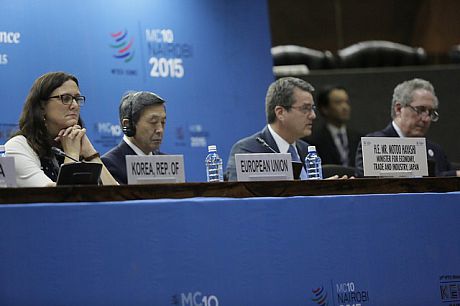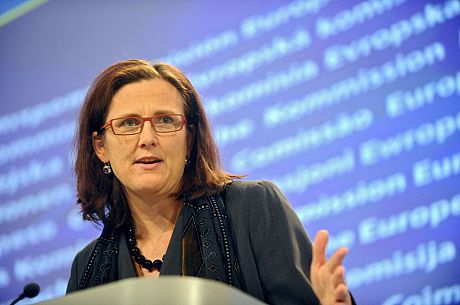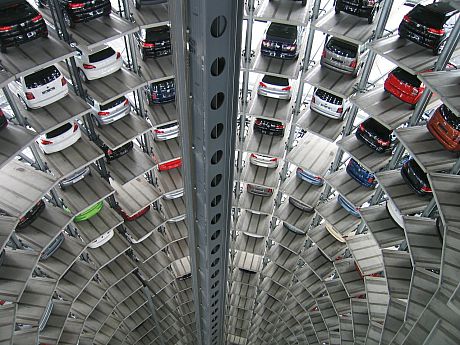Delaying EU-UK trade negotiations would cost billions – in the best-case scenario
Dr Emily Lydgate is a Lecturer in Law in the School of Law, Politics and Sociology at the University of Sussex, and is a member of the University's UK Trade Policy Observatory.
According to government sources at the weekend, the UK probably won’t trigger Article 50 until late 2017. At this point, it is crucial the EU and UK begin negotiating their new trade agreement. Delaying until after Brexit and relying on WTO rules in the meantime would cost the UK billions – in the best case scenario.
The worst case would see trade conflicts erupting and negotiations with the rest of the world in indefinite limbo.
The much-heralded ‘WTO option’ - simply falling back on existing World Trade Organisation tariffs – is less like a safety net and more like running the gauntlet. Even if we were allowed to do this, which is far from guaranteed, it would be a very uncomfortable existence.
 The 'WTO option' for British trading is 'less like a safety net and more like running the gauntlet'.
The 'WTO option' for British trading is 'less like a safety net and more like running the gauntlet'.
Photo courtesy of WTO (CC BY-SA 2.0)
In an earlier post in this series, Professor Erika Szyszczak set out basic legal issues of withdrawing from the EU under Article 50 TEU to the tune of the Eagles’ Hotel California.
In counterpoint to the New Kids on the Block song Step By Step, here I show why the current proposal for post-Brexit trade negotiations would lead to a damaging breakup indeed.
What does the EU say?
Or, Step 1: We can have lots of fun
Cecilia Malmström, EU Trade Commissioner, has stated that the UK must first exit, then negotiate its trade agreement with the EU. In the interim, the UK and EU would trade under WTO rules. (In an erroneously-published press release, International Trade Secretary Liam Fox echoed this view.)
 Cecilia Malmström, EU Trade Commissioner, has stated that the UK must first exit,
Cecilia Malmström, EU Trade Commissioner, has stated that the UK must first exit,
then negotiate its trade agreement with the EU.
The basis for this position is that the EU has exclusive competence over common commercial policy, and EU countries must work together in sincere and close cooperation. If interpreted strictly, this could mean that the EU can’t negotiate even an informal trade deal with the UK while it is still a Member State.
It is still unclear whether the EU will adopt Malmström’s position, but if it does, it would be very problematic for both the UK and the EU.
What does the law say?
Or, Step 2: There’s so much we can do
Determining the process by which the UK withdraws from the EU is an unprecedented problem, and trade negotiations fall into a grey area. This means the law can easily bend to the politics.
Article 50 is vague and was never meant to be actually used. Despite Malmström’s strong position, Article 50 does not prohibit EU-UK trade negotiations until after withdrawal. If anything it seems to encourage ‘taking account of’ these negotiations:
‘The Union shall negotiate and conclude an agreement with that State, setting out the arrangements for its withdrawal, taking account of the framework for its future relationship with the Union.’ (Article 50(2))
Also, the EU could still maintain exclusive commercial competence, and cooperation with the UK, during Article 50 negotiations. The UK and EU can simply make clear that negotiation outcomes on a trade deal will not apply until after the UK formally withdraws.
Reasons not to delay
Or, Step 3: It’s just you and me
Postponing trade talks until after the UK has left the EU would dampen investment by drawing out uncertainty, further rocking the economy and prolonging the EU’s Brexit headache.
 Postponing trade talks until after the UK has left the EU 'would dampen investment by drawing out uncertainty'.
Postponing trade talks until after the UK has left the EU 'would dampen investment by drawing out uncertainty'.
Also, it would make progress in withdrawing from the EU difficult. Imagine trying to discuss immigration reform, for example, without considering the UK’s departure from the single market and what would replace it.
Concluding negotiations is key to re-gaining global trade stability. Other countries need to understand the new EU-UK trade relationship before they can strike new trade deals with the UK.
The UK’s departure from the EU could even constitute grounds for countries to re-negotiate or invalidate existing Free Trade Agreements (‘FTAs’) with the EU. The EU needs to settle its relationship with the UK as rapidly as possible to appease its trade partners.
Expecting too much of the WTO
Or, Step 4: I can give you more
There is a deeper problem with Malmström’s statement: it assumes that WTO rules are a readily-available option in the awkward interim period when the UK has withdrawn from the EU but the new trade deal has not yet been concluded (which could take a decade!)
In the best case scenario, this is an expensive option. Take the example of cars: applying the EU’s 10 per cent tariff to 2014 exports from the UK would cost well over a billion pounds. And the pain goes both ways: one in three cars sold in the UK come from Germany, and would face the same tariff.
 One in three cars sold in the UK come from Germany - and would
One in three cars sold in the UK come from Germany - and would
face a higher tariff under the WTO option.
In the worst case scenario, other countries could challenge the EU if it applied the same tariffs once the UK leaves.
The WTO is not a monolith that assigns tariff rates, but a forum where countries negotiate.
And there are other challenges, like disentangling the UK from EU quotas on agricultural imports. As our recent analysis concluded, the ‘WTO option’ itself requires complex negotiation.
Then how should we proceed?
Or, Step 5: Don’t you know that the time is right?
First, the UK and the EU should commence negotiations on a future trade agreement as soon as Article 50 is invoked: delaying further undermines political and economic stability and makes negotiations more difficult.
Second, the EU should not expect to rely on its existing WTO tariffs after the UK has left and before a new EU-UK trade agreement is concluded, as it is (best case) expensive and (worst case) not even possible due to objections of other countries.
The EU needs to find a way to maintain stability in its WTO-status while negotiating its future trade relationship with the UK.
Disclaimer:
The opinions expressed in this blog are those of the author alone and do not represent the opinions of the University of Sussex or UK Trade Policy Observatory.
Mailing list
Sign up to receive updates on UKTPO activity.




